
Germany coup plot: The extremists who tried to topple the state
Three alpaca stared bleakly at us as we rounded what seemed like the umpteenth sharp bend along the rural roads of the east German region of east Thuringia.
Looming behind the animals, perched on a hill, we finally saw what we'd travelled all this way for: the stone turreted towers of the neo-Gothic hunting lodge, Schloss Waldmannsheil.
HQ, to a large extent, until this Wednesday, for an eclectic group of plotters, hoping to take over the German parliament and destroy the structures of modern Germany, replacing them with a monarchical system, with a Prince at its head, whose family used to rule this region for hundreds of years before World War One.
And all this to be done and dusted by Christmas.
Sound incredible, almost unbelievable?
It does. And the said prince is now spending the festive season behind bars, in police custody.
But German security services were sufficiently concerned about the attempted coup to launch one of their biggest ever raids, nationwide and beyond (in Austria and Italy), involving 3,000 officers, searching 150 properties and arresting 25 people in total.
Intelligence officers told us to expect more detentions in the coming weeks and months as the investigation continues. And German media is buzzing with talk of increased security in and around the country's federal and regional parliaments.
 Heinrich XIII was arrested for his part in the plot
Heinrich XIII was arrested for his part in the plot
Media-wary neighbours grudgingly told me they'd seen lights on in the lodge but hardly noticed people going in or out in recent months. Visitors used a side entrance instead, they said. Accessing the building from a forest back road, behind the local graveyard.
We now know why those frequenting Schloss Waldmannsheil weren't at all keen on being seen.
They'd begun planning a coup back in November 2021 - going as far as to appoint ministers of their eagerly-anticipated new Reich, the new German regime, as well as a military wing to enable their putsch.
"We are appalled," the head of the hereditary prince's family, Heinrich XIV, Fürst Reuss, told me via Zoom from his stately home in Austria. "This outsider was ostracised years ago because of his outlandish conspiracy theories and antisemitic views. He's not representative of our family at all."
Fürst Reuss told me Heinrich XIII wasn't always "like this". All the men in the family are called Heinrich with a number after their name, by the way. There are 30 of them alive today. Number XIII was nicknamed Racing Heinrich in his youth, due to his penchant for fast cars - and beautiful models.
The hunting lodge belonged to the family for hundreds of years, before being confiscated by the East German communist government after World War II.
Racing Heinrich grew into a bitter man, his distant relative told me, with a shake of his head. "He was plagued by misfortune."
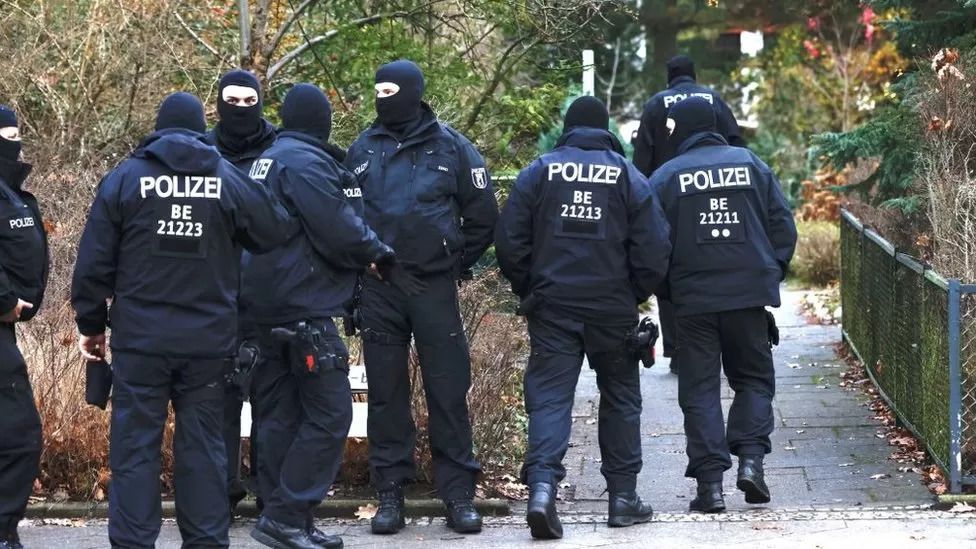 German authorities arrested 25 in the raids
German authorities arrested 25 in the raids
Heinrich XIII has a severely ill daughter, a not very successful real-estate business he runs out of Frankfurt, and he blames the German authorities for the failure of most of his huge number of court cases - attempts to reclaim aristocratic family properties.
The communists used the hunting lodge as a youth hostel. The Putsch Prince - as German media have now dubbed him - ended up having to buy it back himself in the early 1990s after the fall of the Berlin Wall and collapse of the Soviet Union.
"He ended up with the wrong kind of friends," Fürst Reuss told me. "As we now see."
The list of protagonists in Heinrich XIII's planned putsch read like those of a spy thriller or perhaps, the spoof of one.
The conspiracy theories-believing 71-year-old German prince, his far younger Russian girlfriend who tried to get backing for the planned coup from the Kremlin, a gourmet chef, a serving member of the elite German special forces, a former police superintendent, a Berlin judge and former German parliamentarian for the hard right Alternative for Germany party.
Birgit Malsack-Winkemann was designated Justice Minister of the planned new regime. Her insider knowledge of parliament was key in planning the pre-Christmas, armed and assumed to be violent take-over.
Agents listening in to phone calls heard the plotters talk about deaths that were "bound to happen". Malsack-Winkemann allegedly also had a passion for the esoteric and, according to investigators, consulted astrology charts to determine which precise day the putsch should be launched.
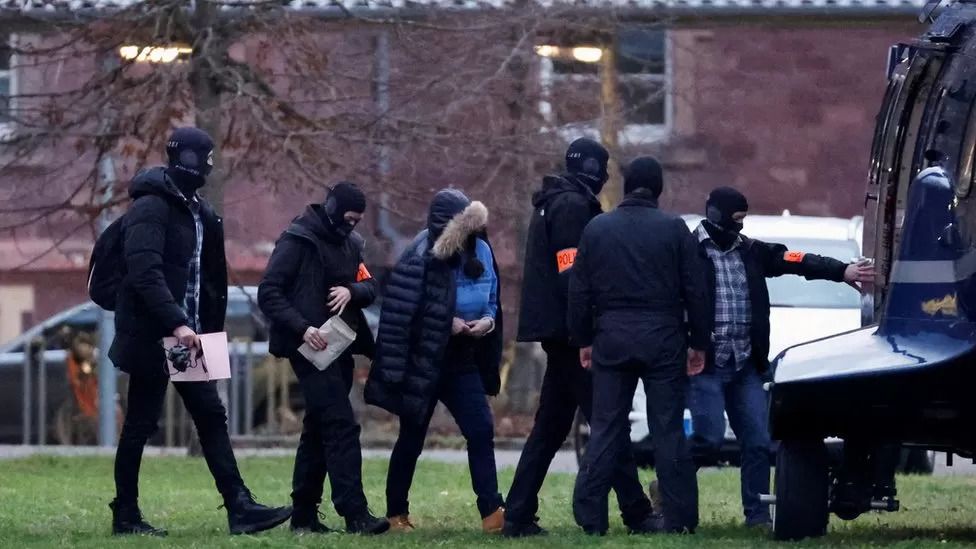 The arrests took place earlier this month
The arrests took place earlier this month
But what really made the intelligence community in Germany sit up and take notice was the cast-list of the group's assembled military wing. Rüdiger von P - as investigators refer to him - was the head of the armed wing, tasked with forcing the group's way into parliament, handcuffing MPs and keeping police forces at bay.
Rüdiger von P is a former lieutenant colonel and commander of an elite parachute regiment, suspected of hoarding and stashing weapons while in active duty according to German media.
Directly under him was currently-serving elite special forces officer, Andreas M, and former army colonel, Maximillian Eder - who has a prolific presence on social media platform Telegram, and recently sent a video message to friends warning of social upheaval before Christmas. Also in the mix: discharged former chief inspector and open conspiracy-theorist Michel F and survival expert and neo-Nazi linked Peter W. Investigators say he came to their attention back in April when they searched his apartment and found firearms and ammunition.
In the raids this Wednesday, weapons were found in 50 of the properties searched, which included army barracks in southern Germany. One of the police officers at the prince's hunting lodge reportedly told neighbours they were searching for munitions and explosives there.
Just how wide-spread extremist ideology runs in German security forces, no-one is quite sure, which is extremely worrying, according to Nicholas Potter, a senior researcher into far-right racism and antisemitism at the Berlin Amedeo Antonio foundation.
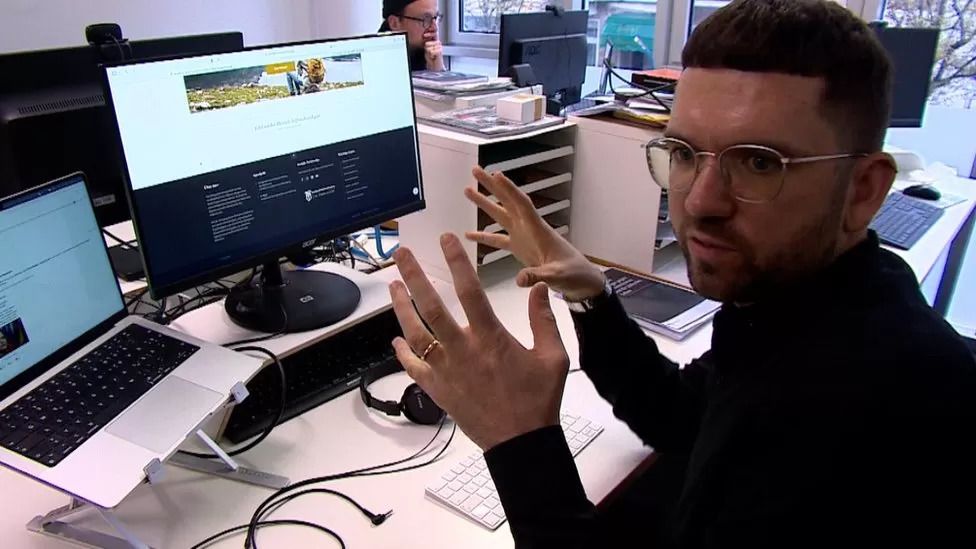 Nicholas Potter is alarmed by the amount of weapons and ammunition ending up in the hands of right-wing soldiers
Nicholas Potter is alarmed by the amount of weapons and ammunition ending up in the hands of right-wing soldiers
He told the BBC about a series of recent scandals in the armed forces, including the disbanding of the second company of the KSK - the elite special forces in Germany - because far-right thinking was so prevalent there.
"The fact that we're seeing an alarming amount of ammunition and weapons just disappearing from bases, and landing in the hands of far-right soldiers. I mean, we're seeing the tip of an iceberg here [in this planned coup case] that I suspect really runs much deeper. This is very alarming. It's important to remember you don't need that many highly trained motivated armed soldiers to pose a very serious threat to democracy."
The coup-plotters included large numbers of so-called Reichsbürger in their ranks. These so-called Reich citizens are individuals - numbering over 21,000 - who don't recognise the legitimacy of the Federal Republic of modern Germany and therefore refuse to pay taxes, accept rulings by German judges or use German number plates for their cars. Reichsbürger believe the legitimate country of Germany ceased to exist after the imperial Reich collapsed after World War I.
In 2016, when police raided a Reichsbürger home to seize illegally held firearms, the homeowner shot at them, killing one of the officers. Intelligence officials told us Reichsbürger have become increasingly radicalised in recent years, though they think only a small percentage are prepared to resort to violence themselves.
This summer, Prince Reuss, Heinrich XIII, organised for leaflets to be dropped through residents' letterboxes in the spa town of Bad Lobenstein - which his hunting lodge is part of - informing them that they weren't proper Germans if they held ID cards from the Federal Republic.
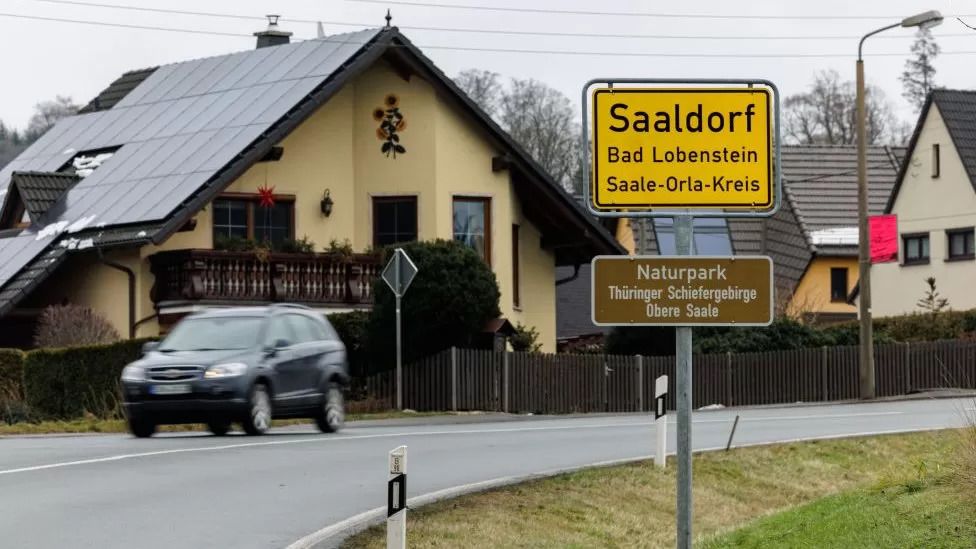 Bad Lobenstein in eastern Germany is home to the hunting lodge
Bad Lobenstein in eastern Germany is home to the hunting lodge
"I thought he was a nutter," pensioner Isabel told us before she popped into the cashpoint in the quaint and cobbled old town centre. "His leaflet had a link to a website where we could order a Reichs passport and driving license with the old red, black and white Reichs flag on it instead of the modern German flag. We were also invited to take part in elections to form a local mini kingdom here. Presumably with him at the head of it. I scrunched up the paper and threw it in a bin."
But not everyone we met in Bad Lobenstein was so dismissive.
Removal man Sebastian told me he had family members and friends who sympathised with the Prince.
"I'm sad to say this but yes. There are a lot of people who aren't happy with this country as it is now. They are suspicious of the German government and would love a different kind of Germany."
Disinformation researcher at Berlin's CEMAS - Josef Holnburger - says studies suggest a whopping 20% of Germans are susceptible to conspiracy theories. Including online Russian propaganda.
He told me Germans were particularly vulnerable at this moment: post Covid-19 pandemic, facing an economic downturn, with energy cost concerns linked to the war in Ukraine. Many blame the authorities.
Stephen Kramer, the regional intelligence chief for Thuringia, the eastern German home of the prince's hunting lodge, pinpoints the Covid-19 pandemic as a turning point - not just in Germany, but across much of Europe. He says extremist groups swoop in in times of crisis, seeking to exploit the situation to their advantage.
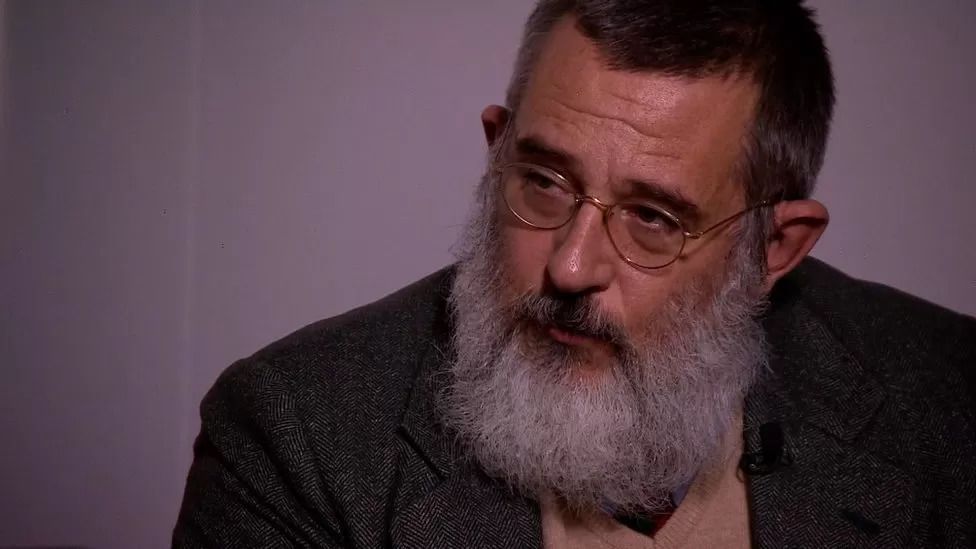 Stephen Kramer says the coronavirus pandemic was a turning point for extremists
Stephen Kramer says the coronavirus pandemic was a turning point for extremists
"Germany's new right and cultural neo-Nazis would never normally go near the Reichsbürger who have often been viewed as crazy or eccentric. But with so many in this country protesting against Covid-19 lockdowns, they saw an opportunity to join forces," he told the BBC.
"They're now co-operating because they have a common goal: to overcome the German Federal Republic. One group claims the federal republic doesn't actually exist [the Reichsbürger], the other [the nationalist hard right] says it exists but wants to replace the republic with a new [authoritarian] regime. They aren't connected ideologically but they are bound by this common goal. They attend demonstrations together where they try to recruit new members."
It was at one of these demonstrations - of 40,000 people in Berlin at the height of the Covid pandemic - that a breakaway group staged a symbolic attempt to storm parliament.
This was a taster of what was to follow five months later in Washington when supporters of then-US President Donald Trump and conspiracy theorists stormed the Capitol. Donald Trump has referred to the Berlin event, saying he heard the protesters there liked him.
He's right. Many in that Berlin crowd look to former US President Trump and Russian President Vladimir Putin as strongmen defenders of - in their opinion - a better, whiter, more conservative Christian society.
Germany has the largest following in the world - outside English-speaking countries - of the US-originating, and Trump-celebrating, QAnon conspiracy theories. They focus hatred towards an alleged "deep state". At its heart they imagine a corrupt, power-hungry, child-murdering and molesting elite. Their enemy is liberal, global, and often Jewish.
German QAnon supporters joined forces with vocal anti-vaxxers, neo-Nazis and Reichsbürger at the German parliament building, the Reichstag, that late August 2020. Police stopped protesters on the steps before they could attempt to push their way in, but symbolically it was seen as a successful day for the German anti-establishment.
Especially as photos of the demonstrators, draped in the black, white and red Reichs flag, were broadcast around the world. That flag is also a neo-Nazi favourite, as all merchandise sporting swastikas are illegal here.
As for improving security in Germany going forward, I was struck while investigating this story how many people we contacted - who could be perceived as "serving" the German establishment - receive regular death threats.
Like disinformation expert Josef Holnburger, who asked to speak to us away from his CEMAS offices for security reasons, and intelligence chief Stephen Kramer, who lives with the knowledge that he's a constant target.
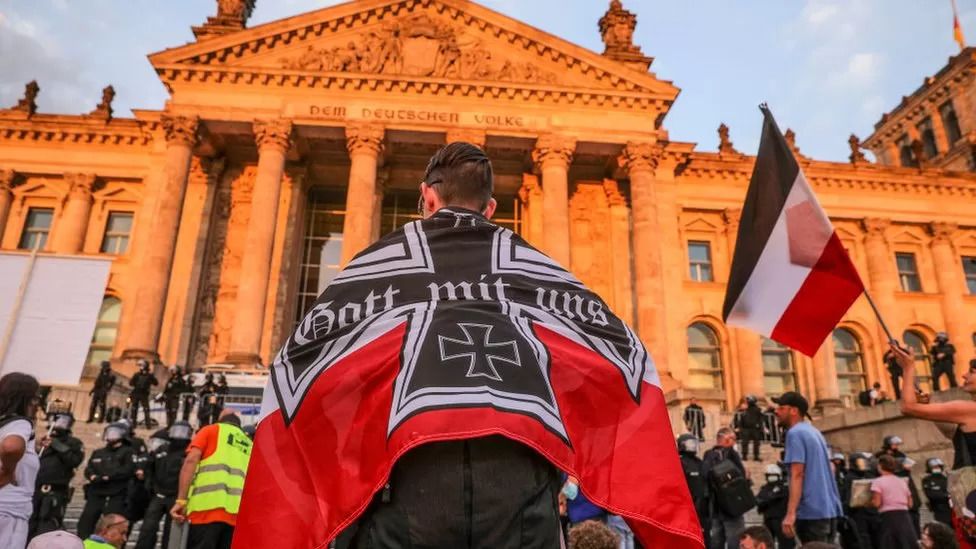 Protesters symbolically attempted to storm the German parliament in August 2020
Protesters symbolically attempted to storm the German parliament in August 2020
The tracker of Germany's far-right Nicholas Potter and his colleagues are often threatened with violence, as is Die Linke MP and anti-fascism campaigner Martina Renner. She shared with us her concern at the rise in Germany, not only of membership of radical conspiracy and new hard right movements, but also the increasing number of associated physical attacks. Even murders.
When we asked former neo-Nazi, turned anti-fascist activist, Ingo Hasselbach, to meet, he warned we wouldn't be able to talk "out in the open".
The thing about toughening security measures against "outsiders" is that the threat also comes very much from within, these days.
Intelligence chief Stephen Kramer describes this as one of the most disturbing developments in recent years.
"Today's extremists are not easily recognisable in public. We have Nazis wearing pinstriped suits, instead of sporting shaved heads; middle aged men wearing corduroy trousers - you wouldn't think were far right radicals. Never mind those on the far left who don't jump out as anarchist extremists. The number of those wanting to overturn our government, and way of life has spread like a cancer in the middle of society - and in growing parts, though it's still a minority - inside the establishment itself."
Stephen Kramer underlines - like all members of Germany's security establishment this week - that, despite the arrests of the coup plotters and the ongoing investigation, they don't believe the safety of the German government or parliament was ever seriously compromised. Though the threat of violence was very real indeed.
"I... prepare for the worst and hope for the best," Kramer told me wryly.
The picture I get of Germany is very different to the reputation assumed outside the country - that of a rule-following, high-tech, low-profile, risk averse, middle of the road, safe and centrist society - embodied perhaps by the stereotype of former chancellor, Angela Merkel.
Nicholas Potter blames that stereotype on the fact that - all too long, in his opinion - far-right or far-left extremist attacks in Germany have been written off as the acts of "lone wolves". He cites the example of the 2019 assassination of conservative politician and vocal defender of refugee and migrant rights, Walter Lübcke. The murderer was associated with the far-right German NPD party and the British extreme right group combat18.
"Of course you can focus on the parts of German society that are supposedly efficient or have good public transport or whatever but this [organised violence]... is also a part of modern German reality. It's not something that's been taken seriously enough to date - as we now see with the Reichsbürger network."











